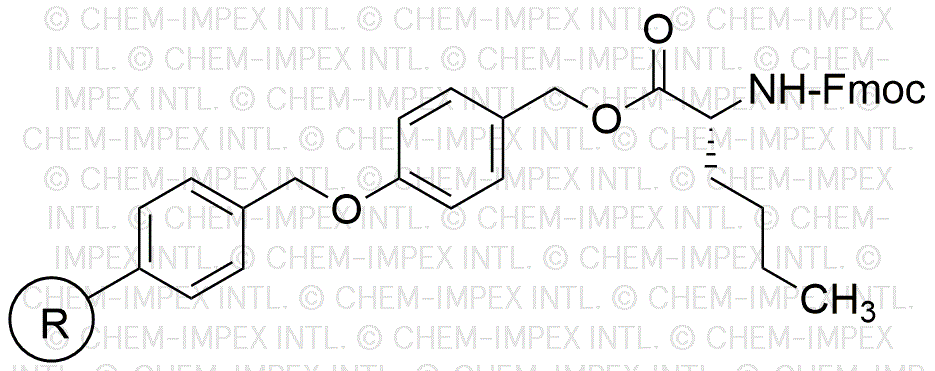Fmoc-D-norleucine 4-alkoxybenzyl alcohol resin is widely utilized in research focused on:
- Peptide Synthesis: This resin is essential in solid-phase peptide synthesis, allowing researchers to efficiently create peptides with specific sequences for various applications in drug development and biological research.
- Drug Discovery: Its ability to facilitate the synthesis of peptide libraries makes it valuable in drug discovery, enabling the identification of potential therapeutic candidates through high-throughput screening.
- Bioconjugation: The resin can be used to attach peptides to other molecules, such as antibodies or drugs, enhancing the efficacy and targeting of therapeutic agents in cancer treatment and other diseases.
- Material Science: In the field of material science, this resin can be employed to develop novel biomaterials that mimic natural tissues, which are crucial for tissue engineering and regenerative medicine.
- Research in Neuroscience: The synthesis of neuropeptides using this resin aids in studying their roles in neurological processes, potentially leading to breakthroughs in understanding and treating neurological disorders.
Informations générales
Propriétés
Sécurité et réglementation
Applications
Fmoc-D-norleucine 4-alkoxybenzyl alcohol resin is widely utilized in research focused on:
- Peptide Synthesis: This resin is essential in solid-phase peptide synthesis, allowing researchers to efficiently create peptides with specific sequences for various applications in drug development and biological research.
- Drug Discovery: Its ability to facilitate the synthesis of peptide libraries makes it valuable in drug discovery, enabling the identification of potential therapeutic candidates through high-throughput screening.
- Bioconjugation: The resin can be used to attach peptides to other molecules, such as antibodies or drugs, enhancing the efficacy and targeting of therapeutic agents in cancer treatment and other diseases.
- Material Science: In the field of material science, this resin can be employed to develop novel biomaterials that mimic natural tissues, which are crucial for tissue engineering and regenerative medicine.
- Research in Neuroscience: The synthesis of neuropeptides using this resin aids in studying their roles in neurological processes, potentially leading to breakthroughs in understanding and treating neurological disorders.
Documents
Fiches de données de sécurité (FDS)
La FDS fournit des informations de sécurité complètes sur la manipulation, le stockage et l’élimination du produit.
Spécifications du produit (PS)
Le PS fournit une description complète des propriétés du produit, notamment sa composition chimique, son état physique, sa pureté et les exigences de stockage. Il détaille également les plages de qualité acceptables et les applications prévues du produit.
Certificats d'analyse (COA)
Recherchez des certificats d'analyse (COA) en saisissant le numéro de lot du produit. Les numéros de lot et de lot se trouvent sur l'étiquette d'un produit, après les mots « Lot » ou « Lot de fabrication ».
Numéro de catalogue
Numéro de lot/série
Certificats d'origine (COO)
Ce certificat d'exploitation confirme le pays dans lequel le produit a été fabriqué, et détaille également les matériaux et composants utilisés et s'il est issu de sources naturelles, synthétiques ou autres sources spécifiques. Ce certificat peut être requis pour les douanes, le commerce et la conformité réglementaire.
Numéro de catalogue
Numéro de lot/série
Fiches de données de sécurité (FDS)
La FDS fournit des informations de sécurité complètes sur la manipulation, le stockage et l’élimination du produit.
DownloadSpécifications du produit (PS)
Le PS fournit une description complète des propriétés du produit, notamment sa composition chimique, son état physique, sa pureté et les exigences de stockage. Il détaille également les plages de qualité acceptables et les applications prévues du produit.
DownloadCertificats d'analyse (COA)
Recherchez des certificats d'analyse (COA) en saisissant le numéro de lot du produit. Les numéros de lot et de lot se trouvent sur l'étiquette d'un produit, après les mots « Lot » ou « Lot de fabrication ».
Numéro de catalogue
Numéro de lot/série
Certificats d'origine (COO)
Ce certificat d'exploitation confirme le pays dans lequel le produit a été fabriqué, et détaille également les matériaux et composants utilisés et s'il est issu de sources naturelles, synthétiques ou autres sources spécifiques. Ce certificat peut être requis pour les douanes, le commerce et la conformité réglementaire.

